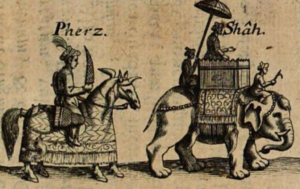| Source (Hebrew) | Translation (English) |
|---|---|
מלכים נפגשו אחד לאחד ומלחמה יעירון בין שניהם ומחנה זה כמחנה זה במספר וחיל מול פני חיל פניהם |
The Kings have met on the battle plain, And war upriseth betwixt the twain. Alike in number is either band, And face to face do the armies stand. |
ונלחמים בלא חרב ורומח וגם נפש ורוח אין בפיהם ומלחמתם בתהבולות ערוכה ובמרמה נבונים מעשיהם |
Devoid of sword and of spear their strife; Within their mouths is no breath of life. In crafty guise is their battle fought; With cunning art is their contest wrought. |
ופעם יגברו אלה לאלה ושם נראה נפילות פגריהם וישובו פגרים אחרי מות ויפילו חללים שונאיהם |
When these prevail o’er their foemen all, Behold, ’tis then that the dead men fall. Yet they from death may arise again, And cast their enemies ‘mid the slain. |
ישיבתם והליכתם(?) אסדר לכל אחד ואחד כאשר הם והמלך והשגל לצדו והפילים והסוסים עליהם |
Their halt and marching will I relate, Each one in order of rank and state. The King, he standeth beside the Queen; Horses and Elephants nigh are seen. |
ומרכבות שנים עוד אלה וגבורים לפניהם(?) עוד כמוהם והמלך שתים כן השגל ואין שוים בלכת פעמיהם |
There stand two chariots likewise here; And facing, warriors, each his peer. The King and Queen o’er two paces range; Yet are their movements diverse and strange. |
והפילים הליכתם בשליש והסוסים לארבע רבעיהם ומרכבות לפנים כל כנגדם ומצדם גם מאחריהם |
Three steps the Elephants, never more; The Horses turn to their quarters four; And straight the Chariots forward fly, Sideways and backward the foe defy. |
ושם תראה בכל פנים חדשות ותתחכם בדרך מעגליהם חכמים חקרו אותם למראש וזאת חקר בעינו כל ספריהם |
In craft each warrior’s bow is bent: Vanquished by science, the foe is spent. In ancient lore are their ways oft told: Behold them writ in the books of old. |
This rhymed poem on chess, חרוז על שחוק האישקקי by an anonymous author, is to be found in a manuscript held in the collection of the Vatican Library (HS. Vatican 171 f.2, oben S. 180.). In the 19th century, the scholar Moritz Steinschneider ascribed the poem to anonymous, and this is reflected in the preface to Nina Salaman’s translation in her Songs of Exile (JPS 1901). Later scholars, beginning with David Kahana, ascribe authorship to Avraham ibn Ezra. (Find Rabbi Abraham Ibn Ezra: A Collection of his Poems and Aphorisms, his Riddles and Epigrams, with a biography, introductions, corrections and notes,, new edition, vol. 1 (Warsaw, 1922), pp. 148-50. This poem figures as No. 119 in his collection.) (Thanks to Abraham Victor Keats, for noting Kahana’s determination of authorship in his 1993 dissertation, Chess in Jewish History and Hebrew Literature (pp. 76-77).)
Source(s)



“חרוז על שחוק האישקקי | Rhymed Poem on Chess (short), by Avraham ibn Ezra (HS. Vatican 171 f.2, oben S. 180)” is shared through the Open Siddur Project with a Creative Commons Attribution-ShareAlike 4.0 International copyleft license.








Leave a Reply